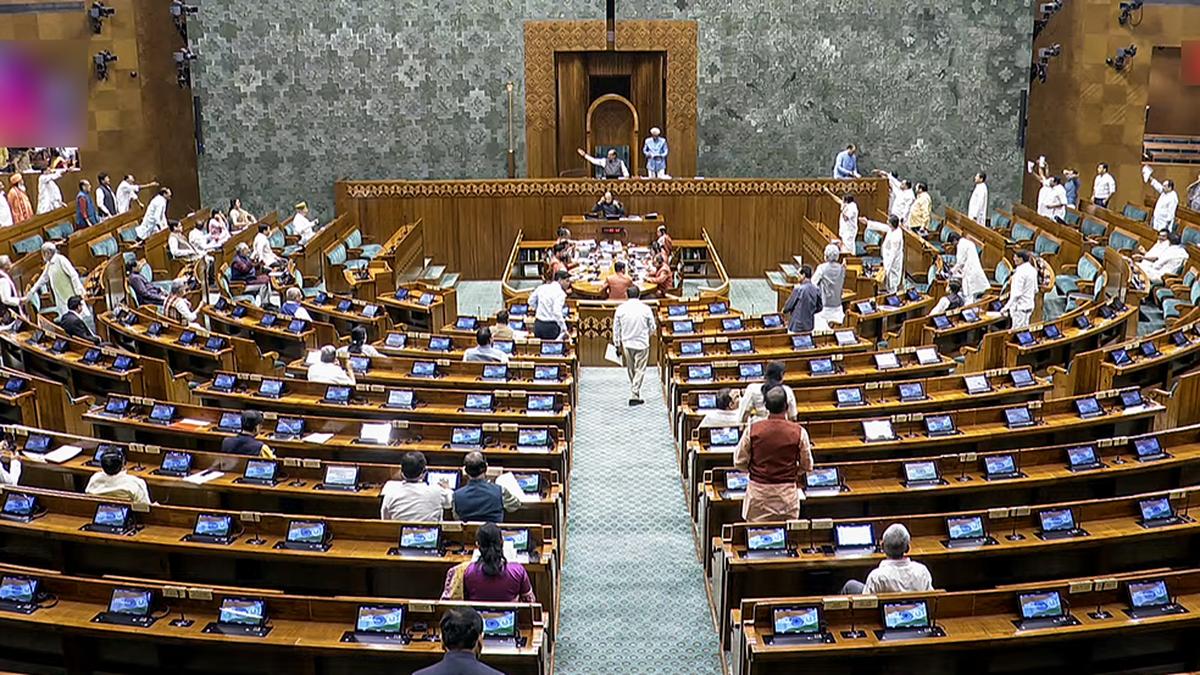
Opposition MPs protest in the Lok Sabha against the Waqf Amendment Bill during the Budget session of Parliament, in New Delhi.
| Photo Credit: ANI
The recently concluded Budget session of Parliament found its place in history. Both Houses sat through the night, closing only before sunrise, when parts of Delhi were just beginning to stir. The productivity of the Lok Sabha was 118% and that of the Rajya Sabha was 119% — numbers that certainly made the presiding officers happy.
This was a rare and significant occasion, but it does not fall into the category of ‘first-ever since Independence’ — a phrase we hear about nearly every event post-2014. For me, though, it was the first as a parliamentary reporter. At 8:30 p.m., the Chair informed the Rajya Sabha that there were still 22 members scheduled to speak. I prepared myself for a long night.
I imagined that such interminable sittings would get dreary. But to my surprise, each member spoke with a sense of urgency. With an eye on the clock, they hastily ran through their points, pleading with the Chair after the last bell for a few more minutes for their final flourish. Often, the closing argument that they hope will stun their colleagues, catapults them to the news pages and becomes viral on social media. However, there are more misses than hits.
I was worried about the looming print deadline. I began receiving frantic messages from the desk demanding the copy. Much like parliamentarians, reporters too have a fine dance to do. While we would like to keep listening to speeches in the fear that we may otherwise miss out important details, we are also keen to send our copy so that it actually makes it to the morning paper. The danger of hearing the same arguments over and over again, especially at night, is to tune out and then miss crucial nuances — the greys between the black and white.
Once the minor trouble of filing the day’s copy was over, I settled down to relish the debates. My exhaustion and anxiety melted away. With thundering monologues, veiled insults, verbal volleys, amusing fumbles, and curious mix-ups, parliamentary debates provide riveting drama. Where else can one see an actor-turned-politician shivering with anger, gesticulating violently but unable to speak a coherent sentence? I wondered if the lack of a written script tripped up the poor thespian. Fifty minutes past midnight, a woman member, who had launched into an impassioned argument in favour of the Wafq Bill, invoked Victor Hugo. She qualified Hugo as a British author. The Waqf Bill has a prospective clause, but the debate on it retrospectively turned a French senator and author into a British citizen. And just when everyone thought there was some light at the end of the tunnel, a Minister who only talks in rhymes rose to speak. Then came the clause by clause passing of the Bill. To pass a clause, the Chair says, “Those in favour may say ‘aye’ and those against may say ‘no’”. Between “the ayes have it” and “the noes have it”, and the Bill finally getting passed only at around 2:30 a.m., I had surely had it.
Don’t get me wrong: it is a privilege to hear parliamentary debates. It is a privilege hard-earned by our predecessors. The parliamentary debates at Westminster, which we so closely mimic, were not public until the late 19th century. It was only in 1840 that the Parliamentary Papers Act permitted newspapers to publish debates as long as they did not do so “with an evil intent”. It was only from 1909 that newspapers which, until then had summarised the debate, were allowed to report them in full. All other limitations were lifted only in 1970 in the House of Commons. In India, in letter, the press has full access to Parliament, but there are several physical barriers to keep us away. There are red lines marked out on the sparkling floors of the new Parliament, which reporters are told not to cross. But we will keep coming back, jumping over the hurdles, to hear debates during the day and at night.
Published – April 11, 2025 01:28 am IST
